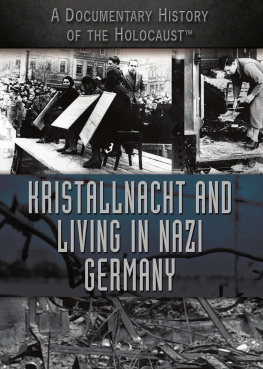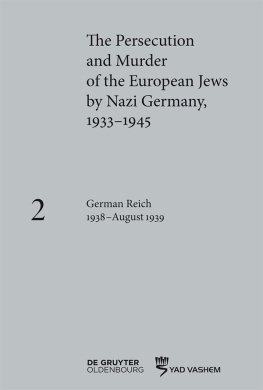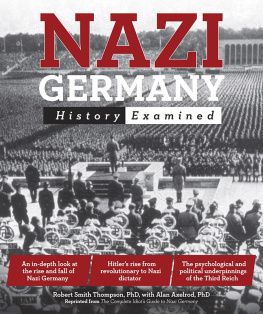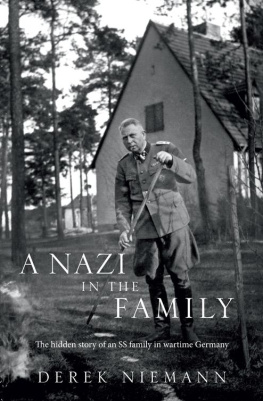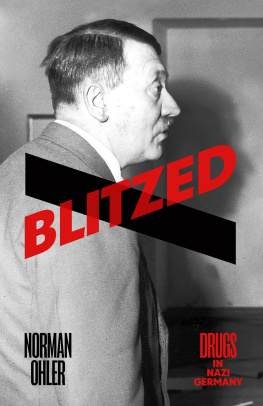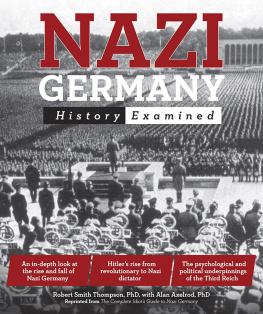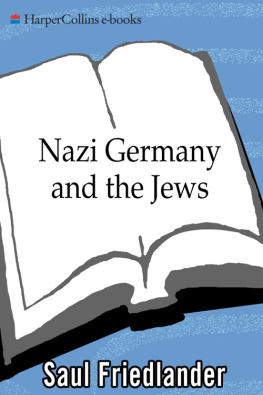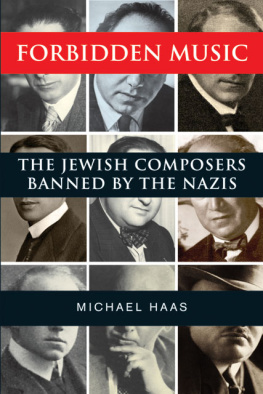MY GERMAN QUESTION
Books by Peter Gay
The Bourgeois Experience: Victoria to Freud (5 vols., 19841998)
Reading Freud: Explorations and Entertainments (Yale, 1990)
Freud: A Life for Our Time (1988)
A Godless Jew:
Freud, Atheism, and the Making of Psychoanalysis (Yale, 1987)
Freud for Historians (1985)
Freud, Jews, and Other Germans:
Masters and Victims in Modernist Culture (1978)
Art and Act: On Causes in HistoryManet, Groupius, Mondrian (1976)
Style in History (1974)
Modern Europe (1973), with R. K. Webb
The Bridge of Criticism: Dialogues on the Enlightenment (1970)
The Enlightenment: An Interpretation (2 vols., 19661969)
Weimar Culture: The Outsider as Insider (1968)
A Loss of Mastery: Puritan Historians in Colonial America (1966)
The Party of Humanity: Essays in the French Enlightenment (1964)
Voltaires Politics: The Poet as Realist (1959; rpt. Yale, 1988)
The Dilemma of Democratic Socialism:
Eduard Bernsteins Challenge to Marx (1952)
My German Question
Growing Up in Nazi Berlin
PETER GAY

Cover illustrations: front: passport of the author as a young man, bearing the Hitler-conferred middle name Israel and the German surname Frhlich; back: the super-good boy, posing a little self-consciously for the camera at the age of three. Front background courtesy AP/World Wide Photos.
Copyright 1998 by Peter Gay.
All rights reserved.
This book may not be reproduced, in whole or in part, including illustrations, in any form (beyond that copying permitted by sections 107 and 108 of the U.S. Copyright Law and except by reviewers for the public press) without written permission from the publishers.
Designed by James J. Johnson and set in Fairfield Medium type by Rainsford Type, Danbury, Connecticut. Printed in the United States of America by R.R. Donnelley, Harrisonburg, Virginia.
Library of Congress Cataloging-in-Publication Data
Gay, Peter, 1923
My German question : growing up in Nazi Berlin / Peter Gay.
p. cm.
ISBN 0-300-07670-3 (cloth : alk. paper)
ISBN 0-300-08070-0 (pbk : alk. paper)
1. Gay, Peter, 1923 Childhood and youth. 2. JewsGermanyBerlin. 3. National socialismGermanyBerlin. 4. JewsGermanyHistory19331945. 5. JewsPersecutionsGermanyBerlin.
I. Title
DS135.G5G39 1998
943'.155004924'0092dc21
A catalogue record for this book is available from the British Library.
The paper in this book meets the guidelines for permanence and durability of the Committee on Production Guidelines for Book Longevity of the Council on Library Resources.
10 9 8 7 6 5
To Emil Busse
Why, this is hell, nor am I out of it.
CHRISTOPHER MARLOWE, Dr. Faustus
Contents
Preface
This is not an autobiography; it is a memoir that focuses on the six years, 1933 to 1939, I spent as a boy in Nazi Berlin. Because I have aimed at more than a superficial recital of the outrages I witnessed and the insults I swallowed, I have surrounded my principal plot with chapters in which I diagnose just what I brought to that experience and what deposits it left on me. This book records one mans story, the story of a poisoning and how I dealt with it. But after listening to scores of refugees across the years, I am confident that what I have to say has more general application.
I have not been silent about my past. In two brief essays, I rehearsed some memorable episodes in my life that will reappear in this account. But here both the narrative scale and my analytical intentions are far more ambitious than those of its slight predecessors. The books origins go back to an informal talk I gave about a dozen years ago to a group of fellows and undergraduates at Yales Davenport College on the invitation of my friend and colleague Henry Turner, then master of that college. The audience was gratifying in size and attentiveness alike, and my presentation generated an intense discussion and the kind of autobiographical anecdotes that are a regular feature on such occasions. Afterward, it occurred to Henry and me that we should have recorded the evening. My determination to make good this lapse, only reinforced by persuasive friends, is the ultimate source of this book. When Gladys Topkis, one of the most durable among these friends and a fine editor, invited me to write it, this long-cherished plan became a realistic enterprise.
For reasons I did not initially appreciate, this has proved a far harder, far more disturbing assignment than I had expected. The intimates who cheered me on virtually promised me that writing my memoir would afford me a long-needed catharsis, that the exploration of my early years would bring me peace of mind. But the promise was not fulfilled. My emotions remain mixed, and ease of mind plays at best a subordinate role. I have derived considerable satisfaction from putting on the record my contempt for those who, with condescension and 20-20 hindsight, have berated the German Jews for attempting to blend into German society and for not emigrating sooner. I felt gratitude to those who saved us in the desperate times of 1938 and 1939and rage, surprisingly fierce after all these years, rage at the world for having been so callous to our plight. My hatred for Nazis past and present did not grow with the passage of time, only because it could hardly do so without my committing mayhem on the next German I encountered. No catharsis here!
This, I have said, is not an autobiography, a disclaimer I want to underscore. For this memoir of enduring a hell in the making necessarily has a melancholy tone that, taken by itself, distorts my personal history. The minor mode, which dominates this book, represents only part of me. That there has been a large measure of suffering in my past is a truth I cannot conscientiously deny, and there are times, I fear, when I have made others suffer in consequence. But as I read over this account, I find that in small matters and large, I have accentuated the negative at the expense of the positive. My chosen theme, of course, made this emphasis inescapable. If I wanted to be faithful to what I had proposed to do, I had to set aside much of the savor of the life I have enjoyed.
Take my appetite for music, which appears here mainly in an anecdote about Nazi mendacity and a comment on my parents puzzlement at my favorite recordings. As a teenager in Havana, I discovered Bing Crosby and the Andrews Sisters. (I am not defending my choices, I am only reporting them.) Once in the United States, I graduated to Glenn Miller and Artie Shaw, and then to Beethovens quartets. I owe this leap to Harvey Potthoff, my friend for more than half a century, who in the year that I met him, 1943, played for me the last of these masterpieces, opus 135. Another old friend, Bob Webb, cured me of my snobbish conviction that Brahms is an unworthy candidate for the affection of serious music lovers. Similarly, beyond noting that I developed a fleeting infatuation with the fiction of Ernest Hemingway shortly after my arrival in the United States in 1941, this book is silent about my pleasures in the classics of modernist literature, Proust and Joyce and Henry James, some of whose writings I first learned to value throughin fact, whose very existence I first discovered inMalcolm Cowleys columns in The New Republic, essays that were to me, a fledgling and uninformed American, an invaluable resource.
I have been just as reticent about my professional career. I would be driving modesty to the point of absurdity if I minimized or denied my successes. There is nothing here about my teaching or my publicationsor what there is serves only to put a spotlight on those terrible years I spent in Hitlers Germany. Yet obviously enough these accomplishments have loomed large in the segments of my life in which the Third Reich played no part. I have been almost as reserved about one of the greatest blessings I have been fortunate enough to enjoy: friendship. I still miss Richard Hofstadter and Henry Roberts, both of whom died untimely in 1970, and I wish they could have read this account of a past about which I talked to them freely. And, to put it tersely, I have been lucky in love. Almost none of these ingredients have found their way into this memoir.
Next page

